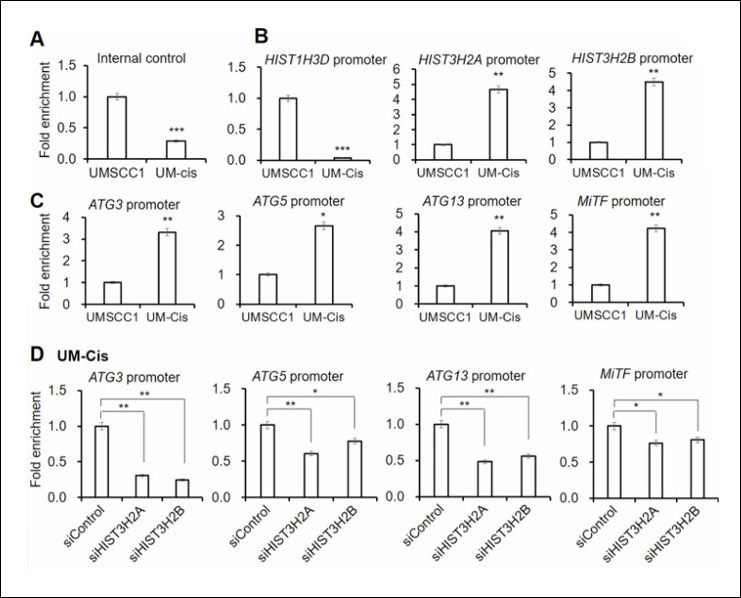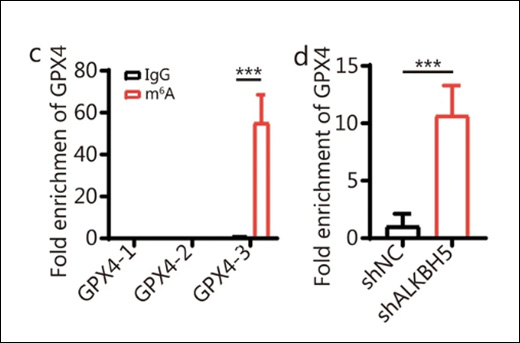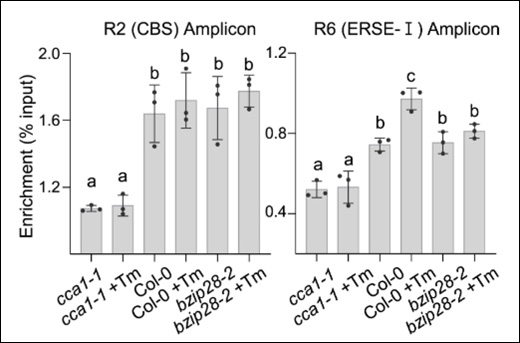Ulhe A et. al. (February 2025). Alpha-linolenic acid-mediated epigenetic reprogramming of cervical cancer cell lines Epigenetics. 20(1):2451551.
This study investigates the epigenetic effects of alpha-linolenic acid (ALA) on cervical cancer cell lines. ALA treatment altered DNA methylation and histone modification patterns, leading to the downregulation of the oncogene hTERT and upregulation of tumor suppressor genes (CDH1, RARβ, DAPK1). These findings suggest that ALA may have a therapeutic role in cervical cancer by modulating epigenetic markers.
Products Used: EpiQuik Nuclear Extraction Kit, FitAmp Blood and Cultured Cell DNA Extraction Kit, MethylFlash Methylated DNA 5-mC Quantification Kit (Colorimetric), EpiQuik DNA Methyltransferase (DNMT) Activity/Inhibition Assay Kit (Fluorometric), EpiQuik HDAC Activity/Inhibition Assay Kit (Colorimetric)
Shao N et. al. (February 2025). USP5 stabilizes YTHDF1 to control cancer immune surveillance through mTORC1-mediated phosphorylation Nat Commun. 16(1):1313.
This study examines the role of USP5 in stabilizing the m6A-binding protein YTHDF1, which promotes tumor growth and immune evasion. USP5 prevents YTHDF1 degradation through mTORC1-mediated phosphorylation, while CUL7-FBXW8 facilitates its breakdown. Targeting USP5 enhances anti-tumor immunity and improves the effectiveness of PD-L1 blockade, highlighting its potential as a therapeutic target in cancer treatment.
Products Used: EpiQuik m6A RNA Methylation Quantification Kit (Colorimetric)
Lei Y et. al. (January 2025). Genome-wide characterization of the AlkB homolog (ALKBH) gene family in Litopenaeus vannamei identifies LvALKBH1 and LvALKBH8 as promising crustacean m6A demethylases involved in molting regulation and ammonia stress response Int J Biol Macromol. :140425.
This study explores the ALKBH gene family in Litopenaeus vannamei and identifies LvALKBH1 and LvALKBH8 as potential m6A demethylases. These enzymes regulate the m6A methylation and expression of key genes involved in molting and ammonia stress response. The findings provide insights into the m6A demethylation machinery in crustaceans, addressing a gap in understanding their epigenetic regulation.
Products Used: EpiQuik m6A RNA Methylation Quantification Kit (Colorimetric)
Bai H et. al. (February 2025). Chinese sacbrood virus mediates m6A modification to target and suppress the expression of hemolymph maintenance gene AF9, exacerbating bee infections J Virol. :e0211724.
This study investigates how Chinese sacbrood virus (CSBV) alters m6A modifications to suppress the expression of the hemolymph maintenance gene AF9 in honeybee larvae. By inhibiting AF9 through AcMETTL3-mediated m6A modification, CSBV weakens the host immune response, promoting viral replication and exacerbating infection. These findings highlight AF9 as a potential target for antiviral strategies against honeybee viruses.
Products Used: EpiQuik m6A RNA Methylation Quantification Kit (Colorimetric)
Zhou H et. al. (February 2025). Oestrogen suppresses the adipogenesis of fibro/adipogenic progenitors through reactivating the METTL3-ESR1-mediated loop in post-menopausal females Clin Transl Med. 15(2):e70206.
This article explores how estrogen deficiency in postmenopausal women disrupts the METTL3-ESR1 loop in fibro/adipogenic progenitors (FAPs), leading to excessive muscular fatty infiltration. By stabilizing ESR1 mRNA, METTL3-mediated m6A methylation suppresses adipogenesis, a process that is impaired after menopause. Reactivating this loop through estrogen supplementation reduces fatty infiltration and improves locomotor function, suggesting a potential therapeutic strategy for postmenopausal muscle degeneration.
Products Used: EpiQuik CUT&RUN m6A RNA Enrichment (MeRIP) Kit
Wang J et. al. (January 2025). Elevated SPARC Disrupts the Intestinal Barrier Integrity in Crohn's Disease by Interacting with OTUD4 and Activating the MYD88/NF-κB Pathway Adv Sci (Weinh). :e2409419.
This study examines how elevated SPARC contributes to intestinal barrier dysfunction in Crohn’s disease by interacting with OTUD4 and activating the MYD88/NF-κB pathway. SPARC overexpression in CD patients and colitis-induced mice disrupts barrier integrity by promoting p65-MLCK/MLC2 signaling, while SPARC-deficient mice show resistance to colitis. These findings suggest that targeting SPARC or its downstream signaling could be a potential therapeutic approach for Crohn’s disease.
Products Used: EpiQuik CUT&RUN m6A RNA Enrichment (MeRIP) Kit




 Cart (0)
Cart (0)













